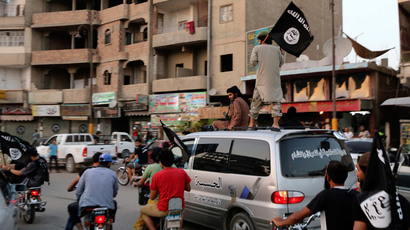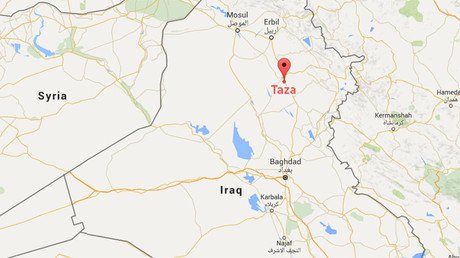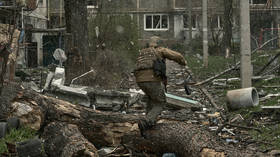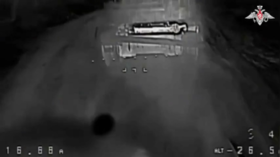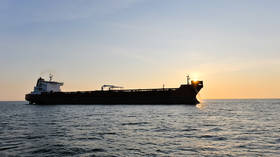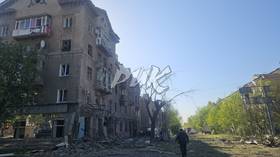ISIS bomb & chemical weapons ‘research center’ in Mosul barely targeted in US strikes
ISIS has been using a high-tech lab in Mosul for building bombs and chemical weapons and training recruits in bomb-making since its capture in 2014. Barely targeted by US airstrikes, the facility has also provided jihadists with some 40 kg of uranium compounds.
“The University of Mosul is the best Daesh [Islamic State, formerly ISIS/ISIL] research center in the world,” Iraq’s top explosives officer Gen. Hatem Magsosi told The Wall Street Journal. “Trainees go to Raqqa [Syria], then to Mosul University to use the existing facilities.”
When the facility was seized by ISIS back in 2014, Iraqi officials reported to UN that some 40 kilos of uranium compounds kept there apparently fell into jihadists’ hands.
“Terrorist groups have seized control of nuclear material at the sites that came out of the control of the state,” Iraq's UN ambassador wrote at the time, adding that such materials “can be used in manufacturing weapons of mass destruction.”
However, the atomic watchdog IAEA said the materials were “low grade” and did not pose any significant security risk, somewhat downplaying the nuclear threat concerns. According to military officials, terrorists are using the well-equipped lab to produce “conventional” explosives and suicide vests, as well as chemical weapons, and peroxide-based bombs.
The lab is well-stocked and has dramatically boosted the terror group’s ability to wage attacks in Iraq, Magsosi told the newspaper. He added that once foreign trainees leave the lab, they return to their home countries with enough skills to make bombs like the ones used in the Paris and Brussels attacks.
Mosul fell into ISIS hands in the summer of 2014, and by March 2015 dozens of jihadists’ scientists and engineers had established their base at the university’s chemistry lab. People familiar with the university said that units were set up for the specific purpose of studying chemical explosives, weapons, and suicide bomb construction.
It is not clear how much damage the US-led coalition operating in Iraq has inflicted on the facility which is well-known to have been under ISIS control for almost two years. The university campus was struck on March 19, according to Col. Steve Warren, a spokesman for the US military in Iraq, without clarifying if it was the first or yet another one in a series of airstrikes on the facility.
“We do know that Daesh [IS] has used some of those buildings for military purposes, and we bombed them,” Warren told the publication, adding that the coalition will continue to strike such facilities if they are uncovered.
In mid-March, Warren acknowledged the US military was aware that “there was a series of chemistry departments over there” and “presumably” some of it was still “useful”, however could not confirm that the terrorists were “assembling chemical weapons there.”
Washington is aware of the reports concerning Islamic State using the campus to produce chemical weapons, US State Department’s Elizabeth Trudeau told RT’s Gayane Chichakyan at a news briefing on Friday. She added that the US is concerned about the use of chemical weapons by the terrorists in both Iraq and Syria, and stressed that the US will continue “to work with partners to mitigate this threat.”
“The coalition has conducted targeted strikes against suspected [Islamic State] chemical weapons facilities including [those] around Mosul. We’ll continue to do that as targets are identified,” Trudeau said, at the same time refusing to give any comment concerning the seizure of uranium.
Iraq’s second-largest city is a strategic center of the self-proclaimed ISIS caliphate, along with the Syrian city of Raqqa. Last week, the Iraqi government announced an operation to retake Mosul from the terrorists. However, recapturing the city will be no easy feat.
According to the Pentagon, it will take between eight and 12 Iraqi brigades – more than 20,000 troops – to gain control of Mosul. Last month, Marine Lt. Gen. Vincent Stewart, director of the US Defense Intelligence Agency, testified at a congressional hearing that recapturing the city is still about a year away.
Chemical weapons practical in stopping army, not terrorism’ – ex-CIA officer
Retired CIA officer and State Department official Larry Johnson believes that the fact that the West is “expressing alarm and concern” over something that has been known for years indicates “there is some other agenda for it.”
“The notion that they are going to have this lab and create this global weapon center is laughable,” Johnson told RT. “That said, the fact they we know they’re there and they’re trying to use it that way, they should be destroyed, they should be killed. I think that’s just so obvious, it sort of bothers my mind, that nobody has been willing to target it.”
Johnson, however, pointed out that chemical weapons are “not very good as terror weapons as they are likewise difficult to produce, and they are difficult to use… but in terms of practical use they are real weapons best-designed to try to stop an invading army.”
“You can use the threat and an idea of weapons of mass destruction to get people to act in ways which are really fairly stupid,” Johnson noted. Meanwhile he believes the idea of “nuclear terrorism” is only “raised to scare people, and once people are frightened to basically allow governments to do whatever [they can] to stop it.”
“As we saw in retrospect, the invasion of Iraq uncovered no weapons of mass destruction but, basically, did unleash a wave of radical Sunni Islamic terrorism that we’re still confronting today ... [most] recently the attacks in Brussels.”
ISIS ‘dirty bomb’ fears as Iraq admits it lost radioactive material https://t.co/OPxlHFW3j5pic.twitter.com/m4DQx2AHzT
— RT (@RT_com) February 17, 2016
While Islamic State terrorists apparently have no capabilities to enrich uranium and create a nuclear device, they could indeed use the stolen materials to try and create a “dirty bomb,” former CIA officer and international lawyer Jack Rice told RT.
Nuclear material is something IS is very well “aware of, something they’re focusing upon and if the West, the Americans and Europeans, were not taking it seriously before, they must be now,” Rice said.
“The thing that makes this important is that if they could set off something like that, what it could do, is essentially make an area that they set it off in unusable for potentially years to come. So contemplate the ramifications of something like that in a major metropolitan area, like Paris, or Frankfurt, or Berlin, or New York.”
READ MORE: Pentagon enrolls ‘dozens’ of Syrian rebels in new training program after failed attempt
Rice also wondered why the facility in Mosul hadn’t been struck back in 2014, when it fell into terrorists hands.
“This is about excluding their ability to touch something and use it as a tool. To exclude their access is one of the most important things that you can do… The effort from the beginning here has always been to isolate them and to make a distinction between who they are who the rest of the Middle East is,” he added. “But if what you’re doing is putting tools in their hands to continue to commit the acts that they are [doing], it’s not just counterproductive, it makes no sense whatsoever.”
